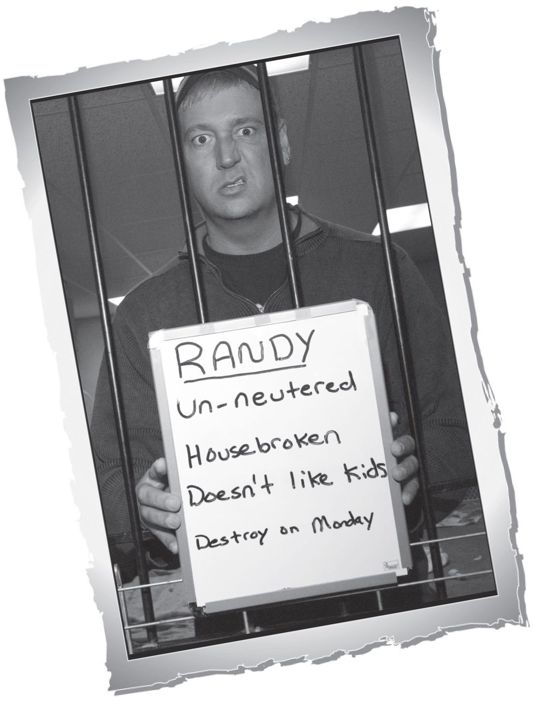I would like to thank my buddy, Melinda, for thinking I am funny, and my mom, Mary Ellen, for putting up with me and my clan. Thanks to my wonderful Stray Rescue family, and to Jenn Foster and Darrell Antalick for their friendship. Thanks also to Jill-Michele Melean and to my editor Ann Treistman and my agent Julie Castiglia, for believing in this book. I would also like to thank Dr. A for listening to my rants and for my Paxil so I could write this book.
Afterword: Randy on a Soapbox
T he excuses youve read in this book are real; the names have been changed to protect the guilty.
Often I am asked, How do you handle the sadness of rescue and returned dogs? I usually say, With vodka and Xanax, which is my way of staying sane and avoiding suckerpunching the next person who walks in the shelter and says, I cant keep my dog because ...
For over a decade, I have been given every excuse imaginable about why I must take their dog off their hands. The time has come for me to wire my jaws shut from this nauseating meal and to teach people the proper way to care for their doga much healthier diet.
Many lame, eye-rolling excuses as well as outright lies are given when someone forces us to take their beloved pet, or when families come back and say they need to return the pet they adopted from Stray Rescue. In my experience, about 2 percent of the excuses are understandable to my psyche. Its the remaining 98 percent that causes everyone at the shelter to experience flu-like symptoms, or to have to fight the urge to go postal, and/or break out the booze.
I have endured many uncomfortable close encounters with dumpers, my term for these folks. Once the leash is out of their hands, the dumper always scurries out the door like a rodent on a mission for a piece of cheese, seemingly guilt-free and ready to start their new life, companion-animal-free. Left on their own, their former faithful friend now has to adjust to an anxiety-filled life behind bars, a pooch prison, waiting for her third lease on life. Grrrrrr. I hope the dumpers cheese is spoiled.
There are hundreds of reasons why companion animals are turned in to our nations strained shelter system. Most shelters have heard every excuse known to man and dog. The most oft-used reasons range from Were moving or Were having a baby to My dog is boring and the ever-common We dont want to put up a fence. (In actuality we did have a dog returned for being lazy. I guess it was my fault; I should have given the dumpers some doggie uppers when they adopted.)
The problem starts where problems usually doat the beginning. Shelter staffs are not trained to provide pet guardians with proper information about training a new dog or puppy, the importance of spaying and neutering their pet, nor solutions to behavioral problems, should they arise after adoption. Likewise, new guardians are not instructed on how to choose the proper dog for their family and lifestyle. Nor do they put much thought into the purchase of a new life , a new member of the family.
Dogs are often chosen because they are a particular breedone thats recently been featured in a popular movie, TV show, or commercial, like a current trendy hairstyle. Another high priority is the color of the dog. If you are a black doguh-oh ... your chances of adoption are pretty low. Rarely do prospective adoptive families look for personality traits that are a good match for them, or think about what level of energy is best suited for their lifestyle. Hordes of perfect companions with the most loving and loyal personalities are passed over in favor of those with a high cuteness quotientyou know, the Benji factor. Just as beauty in humans is more valued in our society than a great personality and a generous heart, the funny-looking dog, the all-black one, and those with the not-so-perfect bodies (like most of us two-legged beings) are doomed most of the time. I think the voluminous number of those make me perfect reality television shows contribute to the problem. It drives me nutty to know that all of this unconditional love is euthanized so effortlessly and with such lack of blame.
Our twenty-first century society increasingly expects all relevant information to be simply handed to us. Maybe we dont stop to consider what we know versus what we dont know about our companion animals. Maybe we think we have the innate intelligence to guide us in raising our kids and our dogs. Consequently, when our new pet gets too big, is too energetic, or isnt playful enough, its not our fault. The problem must lie with the pet, so off he goes to the nearest animal shelter. Since most pets are delivered to humane shelters, our guilt is somewhat alleviated; after all, it wasnt our fault. It was entirely Fidos doing. As long as we avoid learning the statistics of how many animals actually make it out of the shelters (only a small percentage get adopted), we can live with the humane fantasy weve created in order to cope with the reality.
There is a good chance that many of us will try again, bringing home another dog, hoping that this time our new pet will be as perfect as the ones from the commercials and the Westminster Dog Show. Unless we take the time to learn patience, along with the basics of dog behavior, and unless were willing to give our new companion plenty of time and attention, chances are that our poorly chosen pet will experience a short life.
Research has shown that most animals are relinquished to a shelter because of behavioral issues, which are caused by a variety of contributing factors. One colossal reason is the mass production of puppies in commercial kennels (puppy mills) and the lack of responsible breeding practices by backyard breeders, which lead to numerous health and behavioral issues that many guardians with varying degrees of commitment cant or wont handle.
Animals bred and raised in puppy mills are subject to every disease known to man and dog. They are often kept in cramped cages all their young lives without any contact with humans or other dogs, which in turn can do a number on the canine psyche. Their unsuspecting new families often find themselves with a dog who is terrified of open spaces, is incapable of being house-trained in a timely fashion, and who, bewildered by the gigantic humans around him, reacts by being aggressive or by peeing on the floor at the sight of anything over two feet tall. Solution: off to the pound, the dumping ground.
Most people dont realize what constitutes a puppy mill. In actuality, the term canine concentration camp would be more apt. Breeding adult dogs are not given adequate housing, food, exercise, or attention, and usually, little to no medical care. Consequently, they are experiencing hunger, pain, and illness on a daily basis, which naturally causes aggression. Most are unable to properly care for their puppies because their own health is so compromised. Puppies are often weaned away from their mothers and separated from their siblings way too early when sold to brokers. These intermediaries care for the puppies until they are sold to a pet store. This lack of bonding with their mothers and siblings causes many socialization issues that affect the dog (and their adoptive family) later in life.
Plenty of research has shown that this inadequate socialization at a young age leads to a high incidence of dominance-type aggression, as well as fear/defensive aggression. Consequently, these puppy-mill dogs are genetically inferior, both physically and emotionally. Research has also shown that more than fifty genetic diseases can predispose an animal toward aggression/behavioral issues.
Other causes of behavioral issues not related to puppy-mill breeding include chaining or tethering animals for long periods of time, and extended periods of isolation. Animals feel secure when they are part of a pack, and being left alone for twelve hours a day while their family pack is at work (and happy hour) is very stressful to companion animals. Likewise, reinforcing unwanted behaviors with attention or inducing fear through violence and threatening mannerisms can result in a dog behaving poorly. Lack of exercise and mental stimulation can also lead to destructive behaviors, as animals have a great deal of energy that needs to be expended daily. (This sounds almost human, doesnt it?)













